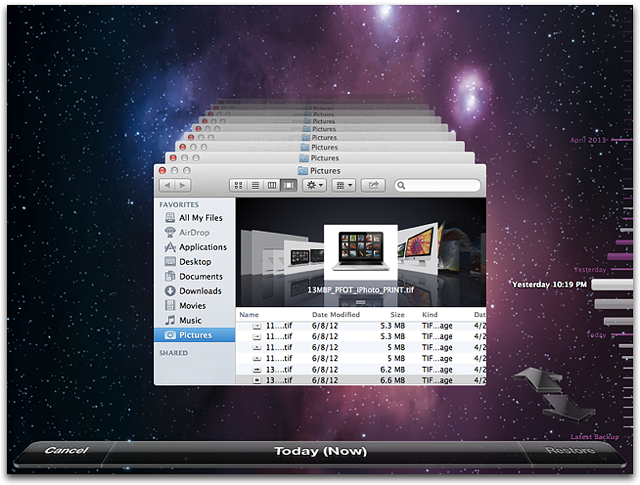Averting Disaster - A Guide To Computer Backups (2014)
by Brett Howse on May 21, 2014 9:00 AM EST- Posted in
- IT Computing
- Mac
- Apple
- Windows
- Cloud Computing
- macOS
Final Words
Backups are important. If you were ever to have a catastrophic system failure, or your laptop bag was stolen from your car, any amount of time and money you spend setting up some form of backup will pay for itself hundreds of times over. We all store an amazing amount of our lives in digital form now, and you don’t want to be “that person” who loses everything they have saved over the years.
Take the time now to set up a backup. Here is a summary of the recommended backups for different scenarios:
Single PC or Mac:
Good: Backup to USB hard drive using built-in utilities.
Better: Backup to cloud.
Best: Backup to USB hard drive and cloud for Hybrid Backup.
Multiple PCs or Macs:
Good: Backup to NAS using built-in utilities.
Better: Backup to NAS, then use NAS utilities to backup NAS to cloud.
Best: Centralized backup tool such as Windows Server 2012 Essentials.
NAS Storage:
Good: Backup NAS to internal or external drive.
Better: Backup NAS to cloud storage.
Best: Backup NAS to internal or external drive, and cloud storage.
Consumer Cloud:
Good: Use cloud storage as the default save location for all important files.
Best: Ensure entire cloud drive is synced with PC, then perform PC backups on the cloud data.
Hopefully you are already backing up your data, but if not, then the next best thing would be to have this discussion urge you towards adding a backup system to protect your files.
If you have a backup system that works great for you, sound off in the comments to let others know!











133 Comments
View All Comments
Brett Howse - Wednesday, May 21, 2014 - link
Backing up 6 TB is not an issue unless you modify all 6 TB between each backup, and even then it's really not a big deal. You can stand up 6 TB of network storage for not very much money.It all comes down to whether or not the data is important to you.
Gigaplex - Wednesday, May 21, 2014 - link
Backing up 6TB is most definitely an issue. Local backups require several hundred dollars worth of additional hardware (closing in on $1000 depending on the type of NAS). Off site is even harder, cloud backup isn't even an option so you need some kind of sneakernet.Brett Howse - Wednesday, May 21, 2014 - link
Gigaplex, what I'm saying is that it's not very difficult to achieve this. If you have 6 TB of data that's worth backing up, then I assume that data's worth the couple hundred dollars in hardware required to back it up.Once you move into this kind of data storage requirement, obviously cloud backup is going to get expensive, but there are other options.
You just have to decide if it's worth backing up, or perhaps a subset of the data is worth backing up.
Before you can dismiss any backup, all you have to do is decide how much the data is worth to you.
kamiyo - Wednesday, May 21, 2014 - link
There's SyncBack which has multiple levels of features, the lowest being free. I guess it's technically not a backup solution, but more of a backup helper, but it allows you to schedule and backup specific files/folders (or whole drives) and much more. It was recommended by a friendImpulses - Wednesday, May 21, 2014 - link
SyncBack and MS SyncToy are both decent freeware options for the simpler backup jobs.SeanFL - Friday, May 23, 2014 - link
SyncToy did not scale well to a hundred thousand picture files I had years ago...it starting creeping extremely slow even on incremental backups. Maybe there was some improvement somewhere? Didn't see any new version last time I looked.dstarr3 - Wednesday, May 21, 2014 - link
I swear by SyncBack. It's a ridiculously simple way to manage file backups on an external drive.BeethovensCat - Sunday, May 25, 2014 - link
SyncToy has been reliable for me. But lately I have shifted to FreeFileSync for syncs to my external HDDs. Seems to be faster and work better (sometimes the total file sizes on my internal backup drive and the external HDD differed with SyncToy - set to Echo - never figured out why). I have confidential work files on my external HDD (WD Passports) so I encrypt everything with TrueCrypt. Can afford to loose a HDD, but wouldn't like the data to end up in the wrong hands.hasseb64 - Wednesday, May 21, 2014 - link
For nonprofessionals: Avoid RAID!BeethovensCat - Sunday, May 25, 2014 - link
Not so sure that is true. I have 'played' with RAID 0 for the last ten years and never (fingers crossed) had an array fail. Neither HDD or SSD. I try to run Syncs 2-3 times per week to avoid data loss should it happen. Am using the in-built Intel RAID controllers on Asus motherboards. Seems to be very reliable.